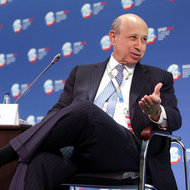 Andrey Rudakov/Bloomberg NewsLloyd C. Blankfein, the chief of Goldman Sachs, spoke at an economic forum in St. Petersburg, Russia, in June.
Andrey Rudakov/Bloomberg NewsLloyd C. Blankfein, the chief of Goldman Sachs, spoke at an economic forum in St. Petersburg, Russia, in June.
Goldman Sachs is facing even more pressure to improve its earnings in the face of a moribund economy.
Goldman said Tuesday that its second-quarter profit fell 12 percent, to $927 million as it and other Wall Street banks have grappled with both a weak market conditions and the continuing European fiscal crisis that have made investment banking and trading less profitable.
Goldman’s profit amounted to $1.78 a share and beat the average analyst estimate of $1.16 a share, according to Thomson Reuters.
But on other important measures, the firm’s results were more disappointing. Its return on equity, a common measure of profitability, tumbled to 5.4 percent, down from 12.2 percent in the first quarter.
Related Links
The firm’s revenue as a whole fell 9 percent from a year ago, to $6.6 billion.
And while revenue in the bank’s core bond trading business rose 37 percent from the period a year ago, to $2.2 billion, it slipped significantly from the first quarter this year. Revenue from other operations, including advising companies on takeovers and stock and debt offerings, declined on both an annual and a quarterly basis.
Goldman executives conceded that they continue to face a difficult environment, one in which the firm will have to fight to produce satisfactory profits.
“While we’re trying to pare down and perform as well as we can in this difficult environment, these aren’t returns that are acceptable to us or to our shareholders, and we know that,” David Viniar, Goldman’s chief financial officer, said on a conference call with analysts.
Shares in Goldman rose slightly on Tuesday, to $93.98. They have fallen 24.7 percent over the last 12 months.
Trading in bonds, currencies and commodities, the fuel for Goldman’s eye-popping profits until recent years, has been battered by tough markets. The firm reported on Tuesday that its average daily value at risk, a rough estimate of how much money it could lose on a difficult trading trading, had fallen for a second straight quarter, to $92 million.
And while Goldman again led other competitors in advising companies on mergers and acquisitions, the economic uncertainty has sapped clients’ appetite for bold and transformative deals.
Banks are also contending with an array of new regulations aimed at reducing risk but also profitability, including higher capital requirements and the banning of some trading done on a firm’s own behalf.
Last month, Goldman, along with 14 other big banks, received a blow to its credit rating by Moody’s Investors Service that signaled continuing weakness within the financial industry. Moody’s cut Goldman’s rating by two notches, to A3, still higher than the ratings of many of its rivals.
One response has been to cut expenses. Goldman said on Tuesday that it was in the process of “implementing additional expense reduction initiatives.” As of June 30, the firm had 32,300 employees, down 9 percent from a year ago.
And its operating expenses for the quarter were $5.2 billion, down 8 percent from the year-ago period and 23 percent from the first quarter.
Another move has been to search for other sources of revenue, including by extending more loans to wealthy customers and corporations from the firm’s private bank.
“I think we’ll continue to do the best we can with our clients, manage our expenses and manage our capital,” Mr. Viniar said on the call.
“But I would not expect that we’re not going to have acceptable R.O.E.’s in a macro environment like this,” he added, referring to return on equity.
Still, some frustration has set in, especially on issues like compensation. Goldman cut the amount of money it set aside for executive pay by 9 percent for the quarter, to $2.9 billion. But for the first half of this year, compensation represented about 44 percent of the firm’s total revenue.
Steve Wharton, an analyst at JPMorgan Chase’s asset management arm, asked Mr. Viniar during the conference call why Goldman’s compensation ratio was not lower — perhaps somewhere in the 30 percent range — given the lower profitability of the firm.
Mr. Viniar responded that simply cutting pay would not necessarily solve the firm’s problems and could lead to some top producers choosing to move to other banks or to hedge funds.
“We could cut comp very dramatically in one year and it would help our returns, but we live in a competitive environment,” he said.
Goldman said on Tuesday that its institutional clients services business, which encompasses trading, was up 11 percent percent from the year-ago period. While fixed-income trading improved from the same time last year, equity trading and commissions both declined sharply.
Investment banking revenues fell 17 percent, to $1.2 billion, marred by a 37 decline in equity underwriting as many companies pulled back from selling stock during the quarter. Financial advisory revenues, which includes deal-making, fell 26 percent.
Revenues in Goldman’s investing and lending arm tumbled 81 percent from the same time last year, as investments in businesses like the Industrial and Commercial Bank of China declined in value.
Investment management, which oversees money for wealthy clients, posted a 5 percent gain in revenues for the quarter because as higher incentive fees offset lower management fees.
Article source: http://dealbook.nytimes.com/2012/07/17/goldmans-earnings-fall-12-in-second-quarter/?partner=rss&emc=rss
Speak Your Mind
You must be logged in to post a comment.